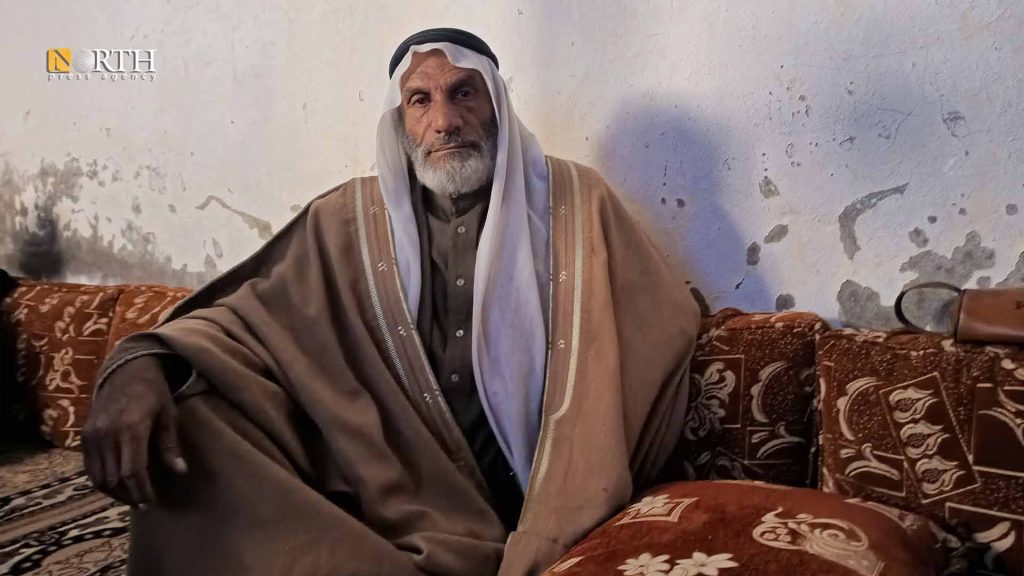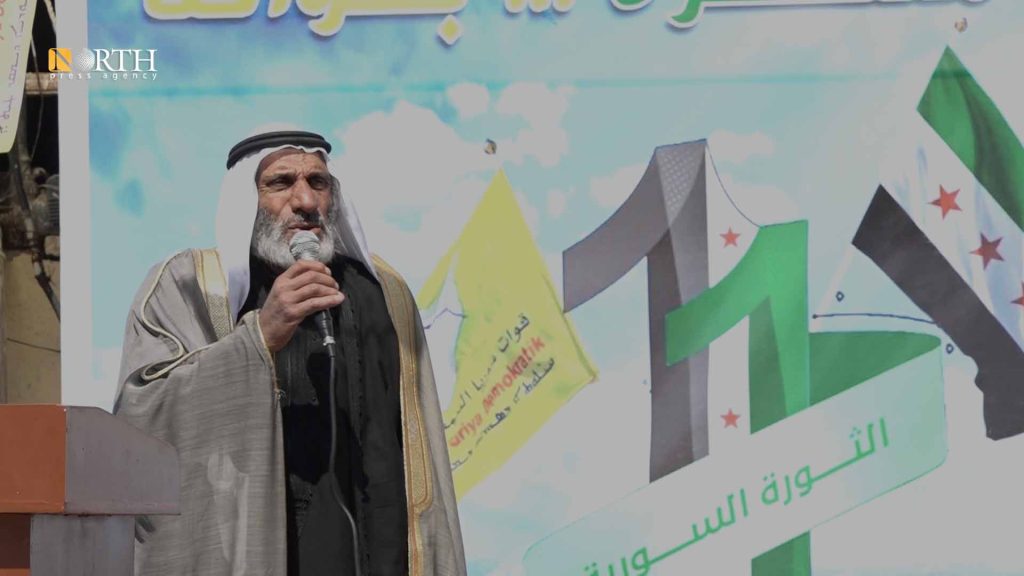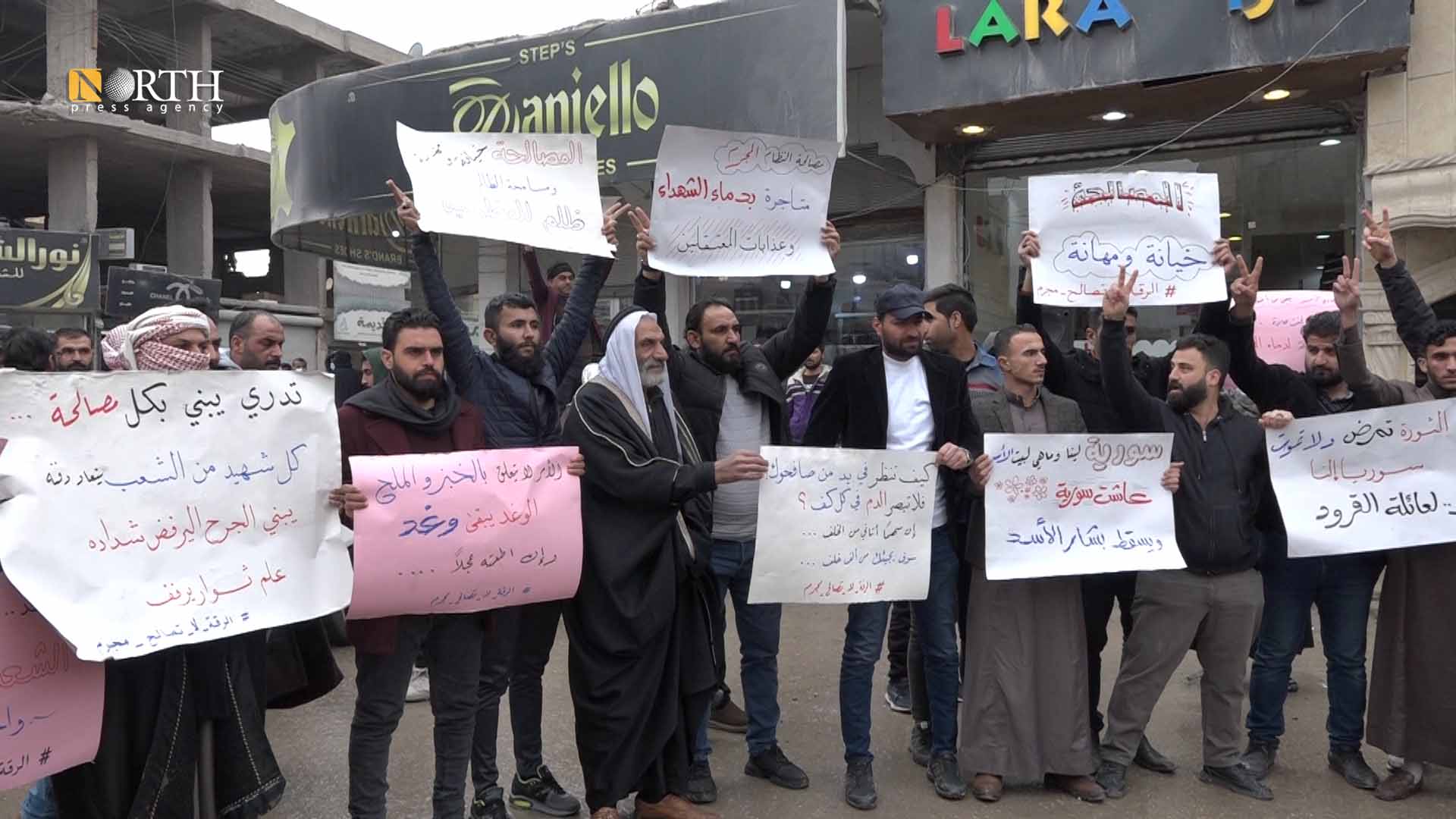Eldest participant in protests in Syria’s Raqqa recalls 11 years of war
RAQQA, Syria (North Press) – Even though his beard turned to grey, yet the anniversary of the Syrian warpushed Hassoun al-Mrandi, known as Abu Taha Sheikh of Revolution, in Syria’s northern city of Raqqa, to recount the first days of the onset of the revolution.
Sheikh of Revolution, now 60, was arrested and tortured several times. However, his attitudes to the revolution never changed. He wasn’t afraid of being tortured or killed by the security forces and so he participated in the public movement in 2011.

Abu Taha Sheikh of the Revolution
“I remember we took to the streets in a peaceful manner and. We faced, the bullets of the gunmen,” he said.
Yesterday, Sheikh of the Revolution took part in an event held in his city to commemorate the 11th anniversary of the Syrian protests. Two months ago, he also participated in the protests against the settlements declared by the government in the same city.
Still, Sheikh of the Revolution opposes the Bashar al-Assad’s government and believes that the ongoing of the protests will bring the Syrian revolution back to its old era.
He was given the name of Sheikh of the revolution as he was the eldest participant in the protests in Raqqa and led several protests that called to topple the government.
Sheikh of the Revolution experienced all the events and protests that the city witnessed. He led the first protest that set off from al-Fardos mosque on March 25, 2011 under the name “Great Friday”.
frequent arrests
As the spark that lit the Syrian revolution started in Daraa, a group of political opposition in Raqqa also moved to keep up with the current events. The first protest in Raqqa was staged from al-Fardos mosque.
Sheikh of the Revolution was a civil servant in Raqqa. He used to follow-up the news of the public movements across Syria and contacted some of his friends living in other Syrian territories. “We used to dream about living in dignity and freedom not under the rule of a dictatorial government,” he told North Press.
However, a decade and a year passed, the Syrian opposition with its various parts have failed to unify in one formation or offer a serious alternative solution for the current government in Syria. The opposition was subject to field successive loses with absence of decision making and fragmented leaders who act according to agendas dictated on them by their own supporters.

Sheikh of the Revolution making a speech on the 11th anniversary of the Syrian revolution
The protests in Raqqa continued for seven months and the protesters’ main chanting was “the people want to topple the government”. All the protesters took to the streets to serve the country without being affiliated with a political party or follow other gains. They were independent peaceful protesters who only dreamed of reform, not sabotage, Sheikh of the Revolution said.
In September, 2011, the military security forces of Raqqa arrested Sheikh of the Revolution for two weeks on charges of participating in the protests. “Many members of the military security forces stormed my house and took me to their center where they ordered me to undress and when I refused, they beat me and insulted me,” he says.
In early 2012, Sheikh of the Revolution was arrested for the second time. The criminal security forces of Raqqa detained him for 37 days where he was brutally tortured, and insulted.
Recalling the pain during the arrest, Sheikh of the Revolution said he was “ill-treated and was jailed in a cell with many people, including women and children, for more than two weeks.”
The third arrest took place by the Islamic State (ISIS) in 2015. He was arrested in the point 11 (now called the national stadium) on charges of dealing with the Free Syrian Army (FSA).
47 days later, Sheikh of the Revolution was released by some mediators.
I never left Raqqa
Sheikh of the Revolution loved Raqqa so much and never left it despite he suffered much there.
He is proud he took part in 17 protests. The biggest one was called the Grand Hour given 125 people were killed at one time in a shelling by the Syrian government on Raqqa.
In March 2013, Raqqa was out of the control of the Syrian government forces. The local councils comprising multiple citizens of Raqqa ran it. Then ISIS entered the city in July 2013 and declared Raqqa as the capital of the ISIS Caliphate.
(photo) Events to commemorate the 11th anniversary of the Syrian revolution
In 2014, fierce clashes between ISIS and the FSA erupted and lasted for three days. ISIS took control and scores of causalities were recorded on the two sides.
Sheikh of the Revolution reluctantly left his house which was destroyed in the clashes and moved to his father’s.
He considers the public movement in Suwayda as a sign of refusing the Syrian government. The Suwayda protests will bring the revolution back to its true course. “The people’s revolution against tyranny and injustice is a notion and the notion never dies.”

